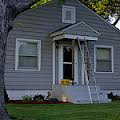What to know when buying a fixer-upper.
If you are in the market to buy a house and have contemplated the idea of purchasing a fixer-upper home with the intent on fixing it up and reselling it, read on for some helpful tips.
Snagging a fixer-upper in a good neighborhood for way below market price and investing some time and money into it to make is a desirable place to live sounds like the perfect idea. Often, it is. But buying a fixer-upper can be fraught with peril. So before you take the plunge, make sure you have a realistic idea of what you’re getting into.
- First you’ll want to do the math. Figuring out what you should pay to buy a fixer-upper starts with a simple equation. First, add up the costs to renovate the property based on a thorough assessment of the condition of the house. Be tough with this estimate, which should include materials and labor — yours and other people’s. Next, subtract that from the home’s likely market value after renovation, drawn from comparable real estate prices in the neighborhood. Then deduct at least another 5 to 10 percent for extras you decide to add, unforeseen problems and mishaps that have to be dealt with, and inflation. What’s left should be your offer. If the house needs significant structural improvements, many real estate experts recommend avoiding it altogether. That’s because major repairs — plumbing and electrical system overhauls, foundation upgrades, and extensive roof and wall work — are usually “invisible” and hardly ever raise the value of the house enough to offset the cost of the renovation.
- Make sure your project will pay you in the end. The ideal fixer-upper is that which requires mostly cosmetic improvements — paint touch ups, drywall repairs, floor refinishing — which generally cost much less than what they return in market value. New lighting fixtures, doors, window shutters, and siding, as well as updated kitchens and bathrooms, are also lucrative improvements.
 Get ready to get your hands dirty. Whatever renovation is required, it’s usually most cost-effective when homeowners pitch in. If you’re not the hands-on type, be prepared to devote a considerable amount of time — months or even years — to closely supervising contractors. But remember that all of your financial gains could be wiped out if the project goes over budget because of mistakes or unnecessary delays
Get ready to get your hands dirty. Whatever renovation is required, it’s usually most cost-effective when homeowners pitch in. If you’re not the hands-on type, be prepared to devote a considerable amount of time — months or even years — to closely supervising contractors. But remember that all of your financial gains could be wiped out if the project goes over budget because of mistakes or unnecessary delays
- Make sure you have all your money lined up. One of the most challenging aspects of purchasing a fixer-upper is paying for the renovation. Understandably, most people don’t have much extra cash after making the down payment and paying closing costs, so coming up with additional money to cover repairs or remodeling can be difficult.

